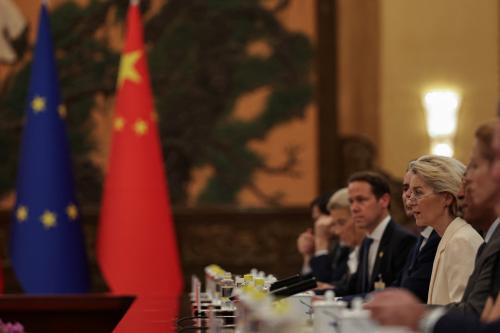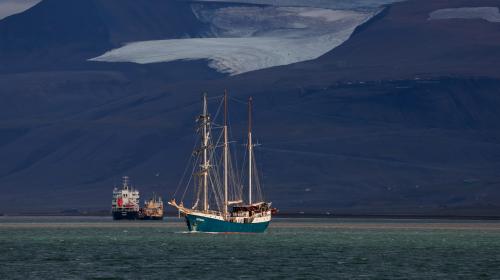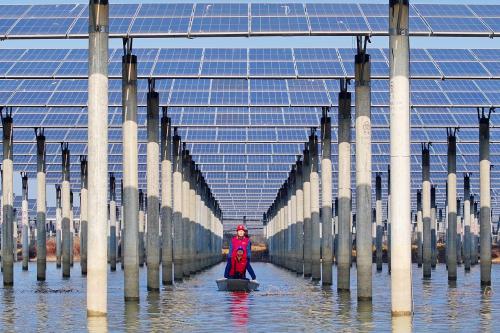Today, the Center on the United States and Europe (CUSE) and the Project on International Order and Strategy (IOS) at Brookings hosted Lord George Robertson for an address on the historic Scottish referendum and the international consequences of the decision. Lord Robertson, taking the “no” position on the vote asked “who would cheer loudest on the 19th of September … if four million Scottish voters decided, say not only but decisively, to break the United Kingdom in two?” (N.b., last April, CUSE hosted First Minister Alex Salmond, MSP, leader of the Scottish government, for an address on Scotland’s future as an independent nation). Lord Robertson continued:
Not the nearly half of the Scottish population who might oppose separation. Not the English who would find themselves in a country that is minus a third of its landmass, without 10 percent of its GNP, and losing five million of its population. And this would be for them a very diminished country whose global position would be open to question. Not the Northern Irish who would see a reappearance of old demons. Nor the Welsh whose desire for more devolution inside the continuing United Kingdom is still is still increasing.
The loudest cheers for the breakup of Britain would be from our adversaries and from our enemies. For the second military power in the West to shatter this year would be cataclysmic in geopolitical terms.
If the United Kingdom was to face a split at this of all times and find itself embroiled for several years in a torrid, complex, difficult and debilitating divorce, it would rob the West of a serious partner just when solidity and cool nerves are going to be vital.
Nobody should underestimate the effect all of that would have on existing global balances and the forces of darkness would simply love it.
Lord Robertson spoke to the wider consequences of the referendum, as many other separatist movements in Europe are watching closely:
The geostrategic consequences don’t stop with what happens in the United Kingdom on the 19th of September. The ripple effects will go much wider than our own shores. The United Kingdom is not alone in having separatist movements.
In Spain, both Catalonia and the Basque country have declared that they want independence. Catalonia where million and a half people marched in the streets demanding independence –and remember that the SNP have never had more than 10,000 people in any demonstration—Catalonia says that it will have its referendum from Spain even if it’s in breach of the constitution of its country.
The Basque extremist have only in the recent past have backed away from terrorism, but they are watching Catalonia and Scotland with quote undisguised interest.
Then there’s Belgium, a country which is held together by a thread. The Flemish nationalists see Scotland as breaking the mold. We’re next if Scotland breaks free and becomes a member of the European Union, they quite openly say.
And as if to underline what this means for Europe, despite its manifest claim to nationhood, Kosovo still finds itself unrecognized by a handful of European Union countries worried about the implications of breakaway for their own separatist movements.
So I contend that it is far from scaremongering to use the term Balkanization to predict what might happen if Scotland were to break from its 300 year old union. The fragmentation of Europe starting on the centenary of the First World War would be both an irony and a tragedy with incalculable consequences.
Lord Robertson also spoke to what he called “a tortured comparison” that some make between the Scottish independence movement and the American Revolution:
There is some significance in all of we Scots speaking here in Washington and in New York and the major cities of the United States of America. Because the possible independence of Scotland maybe resonates with some who were involved in great battles of the past over here. And some people with no real grasp of history make a tortured comparison with the American bid for independence from Britain in the 1770s. Something that was pioneered by the Scots of course who had a lot to do with that.
but if [those] who make this facile comparison understood the history of this country they might look more relevantly at the Civil War where hundreds of thousands of Americans perished in a war to keep the new Union together. To Lincoln and his compatriots the Union was so precious, so important, and its integrity so valuable that rivers of blood would be split to keep it together.
“Let us remember,” Lord Robertson said, “Scotland is not a colony.” Continuing, he said:
It is not oppressed. It’s not discriminated against. It isn’t disadvantaged. Indeed it’s the second most prosperous part of United Kingdom outside of London and the southeast of England. And that’s largely because we are part of the United Kingdom. We are not persecuted.
Scots are prominent, some would say dominant, at every level of British life. We speak the same language; we enjoy the same currency; the same central bank; the same regulatory system; the same public service broadcast; and much, much more. And at the same time as all of that, we have in Scotland a legislative parliament which has full powers on health, education, transport, the legal system, local administration, agriculture, land, tourism and practically every other domestic field. We have, indeed, as Scots, got the best of both worlds.
So what possible justification should there be for breaking up the United Kingdom? What could possibly justify giving the dictators, the persecutors, the oppressors, the annexers, the aggressors and the adventurers across the planet the biggest pre-Christmas present of their lives by tearing the United Kingdom apart? … I fear from time to time that we Scots are living in a veritable bubble in this debate and outside of that increasingly fractious bubble, we’re losing sight of the fact that our decision on the 18th of September will have much wider and bigger implications that any of us yet grasp.
So the next few months, the people of Scotland have to properly and soberly examine the impact of their decision on the stability of the world. And in that time the rest of the ordered world needs to tell us that is actually cares.
Listen to event audio:
In his remarks, Lord Robertson also spoke of the challenges of an independent Scotland’s integration with NATO and the European Union. Brookings President Strobe Talbott, in his Brookings Essay “Monnet’s Brandy and Europe’s Fate,” wrote about the importance of the European project.
The Brookings Institution is committed to quality, independence, and impact.
We are supported by a diverse array of funders. In line with our values and policies, each Brookings publication represents the sole views of its author(s).




Commentary
Lord George Robertson: Forces of Darkness Would Love Scottish Split from United Kingdom
April 7, 2014